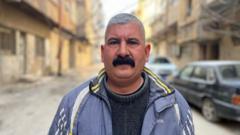In the aftermath of the 2018 chemical attack in Douma, Eastern Ghouta, survivors are voicing their trauma and calling for renewed investigations into the horrifying events that took place. Tawfiq Diam, who lost his wife and four young children, reflects on a time when fear silenced him, stating that speaking out could have meant death at the hands of Bashar al-Assad’s forces. The attack, which occurred on April 7, 2018, was confirmed by the Organisation for the Prohibition of Chemical Weapons (OPCW) to involve chlorine gas, believed to have been released from a Syrian air force helicopter.
On that fateful day, Tawfiq recalls the chaos: “I heard an explosion and people shouted on the streets 'chemicals, chemicals’. I came running out. There was a foul smell.” Eyewitness accounts from that night suggest the death toll exceeded official numbers, with Tawfiq asserting there were over 100 fatalities instead of the OPCW's reported 43.
The Syrian government has consistently denied using chemical weapons, with allies like Russia dismissing the incident as a staged event. This denial has intensified the anger among survivors, such as Khalid Naseer, who lost his wife, two young children, and was set to welcome another child just days after the attack. Khalid emphatically states, “The whole world knows Bashar al-Assad is an oppressor and a liar.”
Eastern Ghouta was a key battleground in Syria’s civil war, enduring five years of conflict characterized by siege tactics and bombings aimed at dislodging rebel forces. Once captured by Assad's regime, records of the atrocities committed were suppressed, leaving families like Tawfiq’s and Khalid’s struggling with their grief.
Chemical weapons have a grim history in Syria, with the OPCW previously documenting numerous attacks linked to government forces. Despite Assad agreeing in 2013 to dismantle Syria’s chemical arsenal, Human Rights Watch identified at least 85 chemical attacks between 2013 and 2018, with a majority attributed to the government.
As survivors navigate the lingering pain of loss, they are also confronting the psychological barriers imposed by their oppressive regime. Former eyewitness Abdul Rahman Hijazi asserts he was coerced into providing false statements regarding the circumstances of the attack, under threats against his family. This pattern of intimidation has left many victims’ families yearning for an opportunity to reveal the truth and seek justice.
The heartbreaking discussions among survivors have led to collective demands for a re-investigation into the Douma attack, as well as acknowledgment of their losses and the retrieval of the bodies they believe may be buried in mass graves. Tawfiq expresses a desperate hope, wishing to give his family a dignified resting place, while Khalid insists, “We want the truth to come out.” Their shared goal transcends personal vengeance; it embodies a quest for justice that resonates across Syria, symbolizing the fight against repression and the pursuit of accountability for heinous acts.



















